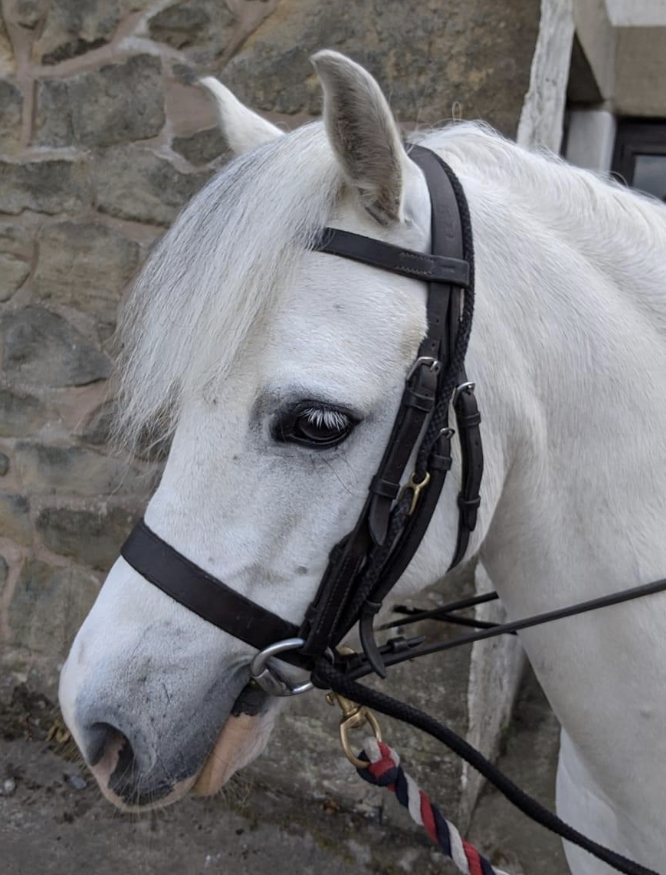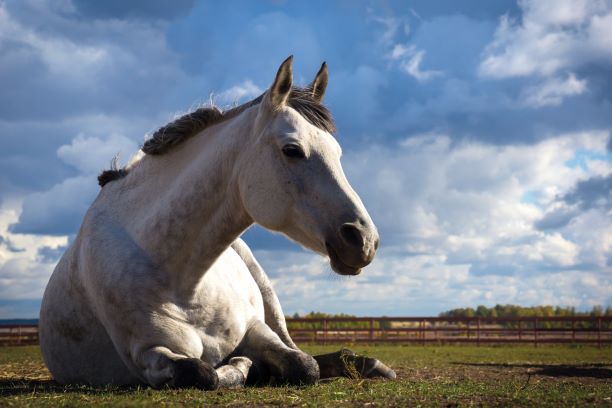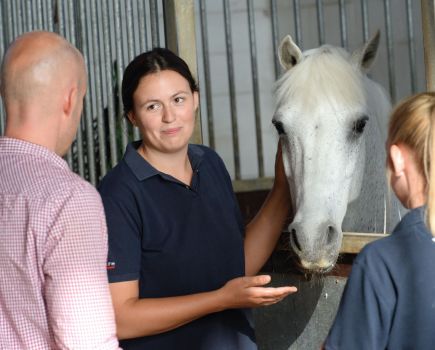Problems with the horse’s stomach can sometimes be attributed to peritonitis, which is a very serious illness that can lead to large claims on any horse health insurance policy. Peritonitis in horses refers to inflammation of the peritoneal cavity, which is the medical term used to describe the abdominal cavity. In very simple terms, it can be likened to a balloon filled with a small amount of fluid in which the abdominal organs sit. The fluid contained within the cavity (peritoneal fluid) acts as a lubricant, reducing friction during movement of the abdominal organs.
When 12-year-old Freddie was referred to me for veterinary assessment, his owner described him as not being ‘quite right’ for the past 48 hours. They reported that the grey gelding appeared quieter than usual, tending towards being a little depressed, alongside a reduced appetite and fewer droppings than normal.
On examination, Freddie’s heart and breathing rates were mildly increased and his gut sounds were reduced. He had a fever of 39.5C. Given Freddie’s history, a rectal examination was undertaken. This revealed no abnormal findings. As a result, anti-inflammatory drugs were administered, and a blood sample was taken for analysis.
Investigating peritonitis in horses
Blood work revealed a low white blood cell count, which can result from white blood cells leaving the blood stream to fight infection. Serum amyloid A, an inflammatory marker, was also high, and a number of other parameters pointed towards mild dehydration. I was advised that Freddie was admitted to our hospital for further investigations and treatment as necessary.
On admission, abdominal ultrasonography was performed, which revealed an increased amount of free fluid in Freddie’s peritoneal cavity. No other abnormalities were noted on ultrasonography. A sample of the peritoneal fluid was subsequently obtained and analysis revealed a high white blood cell count.
A diagnosis of peritonitis was made.
What are the signs of peritonitis?
The clinical signs displayed by a horse infected with peritonitis depend on the cause, duration and severity of the disease. In certain cases, the diagnosis is reached very quickly whereas in other horses, peritonitis is a less clear diagnosis. Due to similarity in symptoms, horses can sometimes appear to be suffering colic rather than peritonitis.
If there is a penetrating injury to the horse’s abdominal wall, a secondary peritonitis is highly likely. Other cases are harder to diagnose, especially those with primary peritonitis, where the diagnosis is ascertained after performing a series of diagnostic tests.
Common signs include:
- As a general rule, horses with peritonitis will present with a history of being off colour and with a reduced appetite.
- When examined, these horses normally have a fever (a temperature greater than 38.5°C), increased heart and breathing rates, may be dehydrated and have evidence of toxaemia.
- Affected horses may also show signs of pain when the external abdominal wall is palpated and may be reluctant to move.
- Signs of colic can also be apparent, especially in those cases that occur secondary to a gastrointestinal cause.
What causes peritonitis in horses?

Freddie made a full recovery from peritonitis
The majority of peritonitis cases seen in horses can be categorised as either primary or secondary peritonitis.
Primary peritonitis
This is a spontaneous disease process without an obvious inciting cause, whereas in cases of secondary peritonitis a cause is identified.
Secondary peritonitis
This can occur when the external abdominal wall is breached following trauma. As a result, bacteria gain entry into the once sterile peritoneal cavity, resulting in a bacterial infection. Secondary peritonitis can also occur following perforation of the gastrointestinal tract or reproductive tract (namely the uterus as a consequence of traumatic foaling).
Other causes of secondary peritonitis include spread of bacteria to the peritoneal cavity from the blood stream (septicaemia), spread of infection from the urinary tract or uterus, from an intraabdominal abscess, from an infected umbilical cord in foals, as a complication of the gelding process, parasites (worms), certain viral infections and finally, neoplasia (cancer).
How is it diagnosed?
Compatible clinical signs will raise suspicions that a horse may have peritonitis, but the diagnosis is confirmed following a number of diagnostic tests, namely blood work, abdominal ultrasonography and analysis of a sample of fluid obtained from the peritoneal cavity.
Affected patients will normally have an abnormal (either high or low) white blood cell count, increased free fluid in the peritoneal cavity on ultrasound examination and peritoneal fluid analysis will reveal a high white blood cell count in addition to high protein levels.
How is peritonitis in horses treated?
I started Freddie on broad spectrum treatment, intravenous and oral antimicrobials, and he continued on the anti-inflammatory therapy when he went home to his livery yard. Intravenous fluid therapy was also initiated due to Freddie’s mild dehydration and reluctance to drink.
Treatment for peritonitis in horses is based on intravenous antibiotic and anti-inflammatory therapy in addition to managing toxaemia if present. Correcting dehydration and maintaining hydration is achieved through the use of intravenous fluid therapy. In non-responding cases, placement of an abdominal drain to facilitate lavage and/or surgical exploration and subsequent treatment may be indicated.
Prognosis ultimately depends on the cause of the peritonitis, severity of the clinical signs and initial response to treatment. Cases occurring secondary to gastrointestinal tract rupture carry a grave prognosis.
What is the prognosis?
In Freddie’s case, he responded well to the treatment initiated and within 24 hours his temperature stabilised and remained normal thereafter. During this timeframe his demeanour, appetite — and in turn faecal output — also improved.
Serial repeat abdominal ultrasound and peritoneal fluid examinations revealed a gradual normalisation and Freddie was discharged after seven days to continue his treatment and rehabilitation at home. He has recovered fully and is back in work.
Unfortunately, not all horses with peritonitis will have such a positive outcome. I know of cases where it is nearly impossible to find a cause, and some patients just don’t respond to treatment. In these cases, the kindest option is euthanasia.
Main image = stock image/Shutterstock









